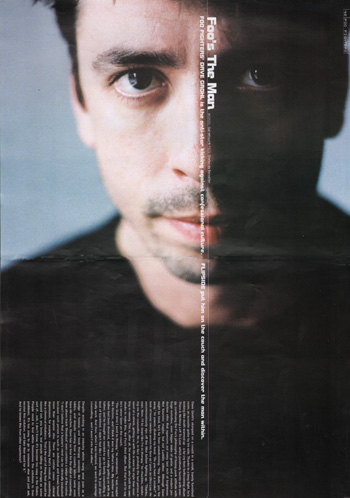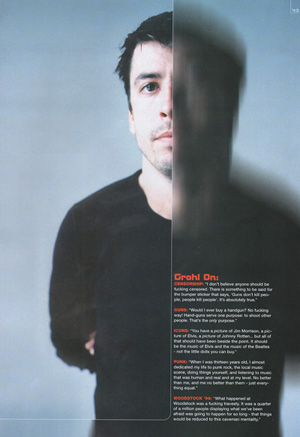 Dave Grohl's slumped on a couch in a small, barely furnished room, an acoustic guitar by his side. Thanks to a long flight, he's looking like death warmed up - a far cry from forthcoming album There Is Nothing Left To lose, which positively bursts with energy, continuing the Foo's philosophy of fusing punk attitude with huge melodies, even bigger slabs of guitar, and a modern production ethic that squeezes out every last inch of brightness. Not futuristic maybe, but not Luddite either. Although Dave might be tired, he's far from unwelcoming. "Hey dude, you fire away," he yawns, shaking my hand. "Do you have a smoke?" A look of horror sweeps across his face as I pass an Ultra Low. He unceremoniously rips off the filter before lighting up. "Thanks, man. Here, I'll lie down like I'm in therapy," he chuckles, rendering me the counsellor. He is. in fact, probably the last person in need of a shrink; getting on with life is more his style than revelling in misery. This is, after all, the workaholic who built his own studio to make this, the Foo's third album. But that's not to say he's never been on the couch.
Dave Grohl's slumped on a couch in a small, barely furnished room, an acoustic guitar by his side. Thanks to a long flight, he's looking like death warmed up - a far cry from forthcoming album There Is Nothing Left To lose, which positively bursts with energy, continuing the Foo's philosophy of fusing punk attitude with huge melodies, even bigger slabs of guitar, and a modern production ethic that squeezes out every last inch of brightness. Not futuristic maybe, but not Luddite either. Although Dave might be tired, he's far from unwelcoming. "Hey dude, you fire away," he yawns, shaking my hand. "Do you have a smoke?" A look of horror sweeps across his face as I pass an Ultra Low. He unceremoniously rips off the filter before lighting up. "Thanks, man. Here, I'll lie down like I'm in therapy," he chuckles, rendering me the counsellor. He is. in fact, probably the last person in need of a shrink; getting on with life is more his style than revelling in misery. This is, after all, the workaholic who built his own studio to make this, the Foo's third album. But that's not to say he's never been on the couch."The first time I went to therapy," he remembers, "I was maybe like thirteen, and I think it was my father's idea. My mother and father had been divorced, and I wasn't really getting on with my father, and tie thought we needed to go to family counselling. It kind of backfired. I didn't feel like I needed help. It just didn't really work. And then, when I was married, we went to marriage counselling... and I wasn't into that either."
Despite working in an industry where many wear pain as a badge of honour, and book therapy sessions like restaurant tables, and despite coming from a country where some even have life coaches, Dave has no time for the ideal of counselling. New album track 'Breakout' even contains a swipe at the notion. "I don't believe that a human's mind can be clinically evaluated because each person is such an individual and knows himself more than anyone else. There are certain cases - clinical depression, for example - something that's medical, something like a chemical imbalance. That's the sort of thing that should be sussed out. you know, but people falling on therapy as some sort of... ooh, I don't know. It's become too easy in the States. People need to find within themselves the solutions to their problems, it's too easy to go to someone else and just ask, receive this solution, and take their word for it."
And he knows this from bitter experience?
"Yeah. There's one time I went to therapy - it was a marriage thing - and I was explaining my life to this man who was evidently a genius" - sarcasm oozes from each enunciated word - "and he says to me, 'Well, David, you haven't been living in reality for the last six years'. And I said, 'Who the fuck are you to tell me what my reality is?' You know, my reality is reality. I have a job and I have a life. I'm not escaping from anything, man. I'm doing what I do because I love to do it. That's when I got to the point where t thought, 'You know what? Fuck it!'." Dave later states that he admires Tom Petty because he's "still an Average Joe". He could be talking about himself, however: when the going gets tough, you won't find superstar tantrums or megabuck head-shrinks here.
"If I need someone to talk to," he explains, "I'm gonna go talk to someone I've known my whole life, and that knows me as well as myself. 'Cause that's the kind of person that's gonna figure you out. Not someone who's had their head in a fucking textbook at a university learning about the general idea of the human mind."
At this point, someone enters to hand him a pack of Marlboro Reds. "Oh, right on, a proper fucking cigarette," he laughs, waving the lung-shredders about. Now he's alert. Kicking against the prevailing trends in Stateside culture has had an amphetamine-like effect - but if you want a summation of the real Dave Grohl, listen to new single 'Learn To Fly'. It might not be a groundbreaking record, but it has a purity. And it soars: "Run and tell the angels that everything's alright".
“It’s sort of this search for inspiration,'' he enthuses, "something that's gonna make you feel alive. It's about searching for something to just make you feel. It's kind of optimistic."
Optimistic it may well be, but in the same tradition as Husker Du, its overriding quality is an indefinable emotion somewhere between euphoria and melancholy. Like many songwriters. Dave's suspicious of expressions of complete happiness in music. "The other day I heard that song 'Walking On Sunshine'," he recalls. "It sounded like Prozac, like lithium - something that someone would use to sort of blur reality."
Continuing on a reality tip, the track 'Stacked Actors' kickstarts the new album with a visceral, unforgiving attack on those who fake it "God bless, what a sen¬sitive mess/But things aren't always what they seem".
It has a lot to do with Hollywood and the absence of reality," he states. "I lived there for a year and a half, and...". His words trail oft as he shakes his head and his eyes begin to glaze, explaining that while there's a place for the theatrical in rock, his problem is with those who sell themselves as real human beings, even though what they're projecting isn't who they reality are. 'What the fuck is that about?" he spits. The song's sarcastic references to a certain person's beautiful chest, their disguises, together with the line 'What will you do/When you're just another ageing drag queen" just scream 'Courtney'. A grin as wide as the Westway appears as he raises his eyebrows and nods like a kid that's been found out.
 "Good call," he sniggers, lighting another fag and sitting up some more. "There's something about a person that aspires to be someone else that kind of bugs me," he argues. If a person doesn’t have enough respect for themselves, or feel comfortable and beautiful with themselves, so much that they want to be someone else, that just kind of makes me feel strange. It makes me feel weird."
"Good call," he sniggers, lighting another fag and sitting up some more. "There's something about a person that aspires to be someone else that kind of bugs me," he argues. If a person doesn’t have enough respect for themselves, or feel comfortable and beautiful with themselves, so much that they want to be someone else, that just kind of makes me feel strange. It makes me feel weird."
'Angry' or 'let down' would be the obvious responses - but "weird"? There's more here than meets the eye. Dave appears a little reflective, then continues.
"It's probably that I've had weird trust issues, like, my whole life; feeling like I've really needed someone to trust, and really wanted to trust someone, and devote - give - my precious trust to someone else. So it's hard to really believe people... In my own mind, I fucking spot people out and I think [snaps fingers]. 'That person's real, I like that person'. I consider myself a good judge of character... though cynical."
For these reasons and more, he's not enamoured with the way he, as the former drummer of The Most Important Rock Band Of The Nineties, is often elevated. The very idea of 'Dave Grohl' being the increasingly rare beast that is The Rock Icon, is something he's never gotten used to. "You'll walk out of a show, and there'll be lots of kids, and a girl will come up to you, crying and shaking: 'Ooh, I can't believe it's you!' - and you just go, 'STOP [taps my knee]. What are you fucking doing?'. Crazy." His desire to be treated normally is unequivocal. The thought of being a crutch for the insecurities of others disturbs him.
"Looking for something that's larger than life reflects something missing in your own life, where you're not content with reality," he explains, "so you look to these creatures. It's important to break down that barrier so people realise that if we weren't on the stage, we would be the people in the audience watching the band onstage. I hope that I make it known that what we do is honest and real. For the sake of making music, and also for the sake of shattering the rock star myth - because we've never, ever been a part of that." For the new album, There Is Nothing Left To Lose (a title inspired by the fact they were in between labels), this meant building a studio in Dave's basement to make the record exactly how they wanted.
"We proved that we don't buy into the bullshit that goes along with making an album these days. The bare bones, soul-gripping sound of rock and roll that you fell in love with twenty years ago has been replaced today by a pristine, product-based, marketing-based sound that people wont be challenged to listen to." The essence of rock 'n’ roll was always, no matter how vague, about having a great time and sticking two fingers up at those who said you shouldn't Given that youth culture has become mainstream, POPULAR culture, to the extent that those clips of Johnny Rotten swearing - that once horrified the nation - now appear as funny asides on respectable quiz programs, Dave takes his hat off to those he considers to still be having a go.
"When Marilyn Manson first came out, I was so excited - like, finally. Satan has made his way back to rock and roll He's been absent too long."
For Dave, it's not about political suss, but respect for yourself and others. It's the essence of all he stands for. The anti-star attitude. The anti-therapy position. He's the antithesis of the circus that surrounded Nirvana's demise, and understands only too well the importance of keeping everything on the level. Almost as an afterthought he adds earnestly:
“I hope people have never seen me or the band as something that's false or unreal We always try to lay it on the line and say, you know, 'We're making music because we love making music - not because we want to be seen as demi-gods”.
Who said all rock stars were air heads?
Words: Gal Detourn Pics: Stefan da Batselier
